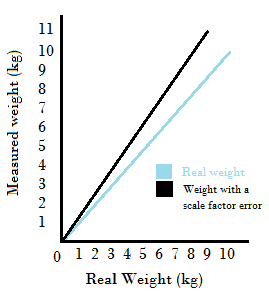A scale factor is a number which multiplies (“scales”) a quantity. For example,the “C” in y = Cx is the scale factor for x. If the equation were y = 5x, then the factor would be 5.
Scale Factor Error
These errors involve a proportional multiplier to a true measurement. For example, a digital scale that is 0.1 g higher than the true measurement will consistently give results that are 0.1 g higher than the true value.

Use in Graded Response Models
The D in the equation for graded response model probability is a scale factor:

Use in Confirmatory Factor Analysis
Confirmatory Factor Analysis allows a researcher to figure out if a relationship between a set of observed variables (“factors”) and their underlying constructs exists, through one or more hypothesis tests. In this sense, scale factors refers to factors that are associated with a particular scale. For example, the Emotional Autonomy Scale (Steinberg & Silverberg, 1986) measures four core components:
- Individuation,
- Perceives parents as people,
- Parental deidealization,
- Nondependency on parents.
CFA could theoretically be used to find underlying factors to this scale. Note that uncovering these factors is often a judgment call; With this particular scale, there isn’t a consensus about its factor structure (Stey et al., 2013).
References
Berkeljon, A. (2012). Multidimensional Item Response Theory inClinical Measurement: A Bifactor Graded Response Model Analysis of the Outcome Questionnaire-45.2. Brigham Young University – Provo.
Steinberg, L., & Silverberg, S. (1986). The Vicissitudes of Autonomy in Early Adolescence. Child Development, 57(4), 841-851. doi:10.2307/1130361
Stey, P. et al. (2013). Factor Structure and Psychometric Properties of a Brief Measure of Dysfunctional Individuation. SAGE. Retrieved March 29, 2019 from: https://www3.nd.edu/~dlapsle1/Lab/Scales_files/Stey%20Hill%20Lapsley%20Dysfunctional%20INdividuation%20Assessment.pdf